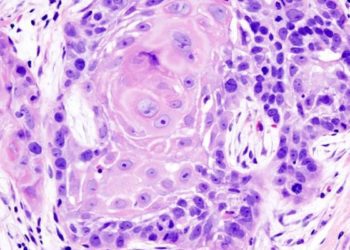Collagenase injection is not noninferior to fasciectomy for Dupuytren’s contracture treatment
1. In this randomized controlled trial, among patients with moderate Dupuytren’s contracture, collagenase injection was not found to be noninferior to limited fasciectomy in improving patient-reported hand health.
2. Collagenase injection resulted in a lower percentage of patients with moderate to severe complications compared with limited fasciectomy.
Evidence Rating Level: 1 (Excellent)
Study Rundown: Dupuytren’s contracture is a manifestation of Dupuytren’s disease, a fibroproliferative disease in which fibrous cords form in the hand, progressively shortening and pulling the fingers into a bent position, interfering with hand function. While there is no cure for Dupuytren’s disease, limited fasciectomy is currently the most common method for correcting Dupuytren’s contracture. Collagenase injection is an alternative treatment; the enzyme is injected into the fibrous cord to weaken it, after which the cord is manipulated to rupture it and straighten the contracted joint. Collagenase injection is superior to placebo, and compared with limited fasciectomy, collagenase has the benefit of a quicker recovery time and performance in a clinic instead of an operating room. The present trial compared the effects of collagenase injection with those of limited fasciectomy on patient-reported outcomes, joint contracture measurements, and incidence of reintervention and complications. Collagenase injection was not shown to be noninferior to limited fasciectomy concerning patient-reported outcomes, joint contracture measurements, and incidence of reintervention. Additionally, the overall percentage of patients with any complication was similar between the groups, but the percentage with moderate or severe complications was lower in the collagenase group. The study was limited by the fact that it was not blinded, which could have influenced patient-reported outcomes. Nevertheless, these findings provide novel insights regarding collagenase injection as a treatment for Dupuytren’s contracture.
Click to read the study in NEJM
In-Depth [randomized controlled trial]: This randomized controlled trial compared the effects of collagenase injection with those of limited fasciectomy on patient-reported outcomes, joint contracture measurements, and incidence of reintervention and complications. Adult patients with moderate Dupuytren’s contracture, defined as having a palpable collagen cord causing contracture of at least 30 degrees in a metacarpophalangeal or proximal interphalangeal joint, were included. The primary outcome was the score on the Patient Evaluation Measure–Hand Health Profile (PEM), a questionnaire for assessing patient-reported hand health, at one year post-treatment. A total of 621 patients participated in the trial, with 326 in the collagenase group and 295 in the limited fasciectomy group. The mean PEM score at one year was 17.8 in the collagenase group and 11.9 in the limited fasciectomy group (estimated difference, 5.9 points; 95% Confidence Interval [CI], 3.1 to 8.8). As such, collagenase was not non-inferior to limited fasciectomy (p=0.49 for noninferiority). Results for other patient-reported outcomes and joint contracture measurements also favored the limited fasciectomy group, and the hazard ratio for reintervention in the collagenase group compared with the limited fasciectomy group was 4.7 (95% CI, 1.8 to 12.3). Concerning complications, while the overall percentage of patients with complications did not differ significantly between the groups, fewer patients in the collagenase group experienced moderate or severe complications (odds ratio, 0.35; 95% CI, 0.13 to 0.91). In summary, collagenase injection for the treatment of Dupuytren’s contracture was not shown to be noninferior to limited fasciectomy for patient-reported outcomes, joint contracture measurements, and the likelihood of reintervention.
Image: PD
©2024 2 Minute Medicine, Inc. All rights reserved. No works may be reproduced without expressed written consent from 2 Minute Medicine, Inc. Inquire about licensing here. No article should be construed as medical advice and is not intended as such by the authors or by 2 Minute Medicine, Inc.







